Posts Tagged ‘Burma Partnership’ (399 found)
Burma’s Peace Process Needs a Fresh Start
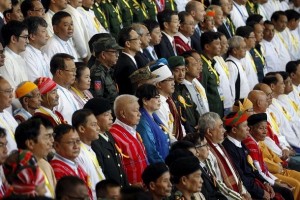
On Union Day, 69 years since the signing of the Panglong Agreement, it is time for a reappraisal and a new start to what has ultimately been an unsuccessful peace process […]
• • •On Union Day, Reappraisal of the Peace Process is Needed
[12 February, 2016] Today, on the 69th anniversary of the signing of the Panglong Agreement, it is time to review the failures of the recent peace process, urged Burma Partnership […]
• • •Protection of People Must be Priority in Burma’s Protracted Peace Process
In a new briefing paper titled, “Protection of People Must be Priority in Burma’s Protracted Peace Process” released to mark Union Day, Burma Partnership highlights how the peace process of the Thein Sein Government has been unsuccessful, ultimately leading to many powerful ethnic armed organizations (EAOs) refusing to sign the nationwide ceasefire agreement (NCA). It also resulted in a call by civil society organizations to postpone the Union Peace Conference […]
• • •New Lease of Life in Burma Parliament but Political Prisoners Left Behind
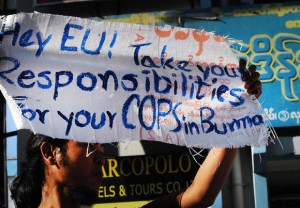 Optimism swept over Burma this past week as hopes for historic changes to the country heightened with the start of the new Parliament dominated by the National League for Democracy (NLD) […]
Optimism swept over Burma this past week as hopes for historic changes to the country heightened with the start of the new Parliament dominated by the National League for Democracy (NLD) […]
NLD’s Trip into the Murky World of the Drugs Trade
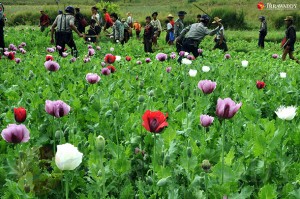 As the new Parliament sits for the first time in Naypyidaw, the National League for Democracy’s (NLD) choice of Union Solidarity and Development Party (USDP) member, T Khun Myat, as deputy lower house speaker demonstrates the intricate and complex web that links the USDP, the Burma Army, the drugs trade, and paramilitary drug militias as well as the dangerous ground the NLD treads in attempting to form a government of national reconciliation […]
As the new Parliament sits for the first time in Naypyidaw, the National League for Democracy’s (NLD) choice of Union Solidarity and Development Party (USDP) member, T Khun Myat, as deputy lower house speaker demonstrates the intricate and complex web that links the USDP, the Burma Army, the drugs trade, and paramilitary drug militias as well as the dangerous ground the NLD treads in attempting to form a government of national reconciliation […]
Time for a Fresh Start for Genuine Peace
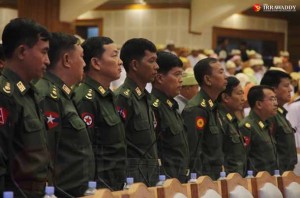 Between 12-16 January, 2015, the ‘Union Peace Conference’ was held with over 700 representatives of the Burma Government, signatories of the Nationwide Ceasefire Agreement (NCA), Members of Parliament, political parties and other invitees in Naypyidaw […]
Between 12-16 January, 2015, the ‘Union Peace Conference’ was held with over 700 representatives of the Burma Government, signatories of the Nationwide Ceasefire Agreement (NCA), Members of Parliament, political parties and other invitees in Naypyidaw […]
Burma Army Moves to Tighten Grip on Power
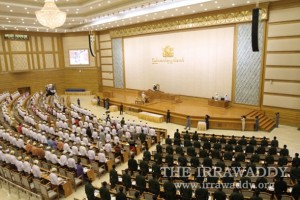 While people were still in a buoyant mood over the November 2015 elections results, wrapping up last year’s work and preparing for 2016, the Burma Army and the Government had a clearly different agenda, initiating several discreet moves in an attempt to maintain its grip on power during the term of the future National League for Democracy (NLD) Government […]
While people were still in a buoyant mood over the November 2015 elections results, wrapping up last year’s work and preparing for 2016, the Burma Army and the Government had a clearly different agenda, initiating several discreet moves in an attempt to maintain its grip on power during the term of the future National League for Democracy (NLD) Government […]
Burma Embarks on a New Chapter as Hope and Suffering Define 2015
 The highlight of 2015 was undoubtedly the historic general elections, which saw Daw Aung San Suu Kyi’s National League for Democracy (NLD) party triumph emphatically at the polls on 8 November 2015. While the conduct of the polls was relatively smooth, the elections were marred by glaring irregularities, in particular during the preparation and campaign stages. They ranged from the partiality of the Union Election Commission (UEC), disqualification of minority candidates, rife voter disenfranchisement of large segments of minority communities due to conflict and blatantly discriminatory policies, and voter lists fraught with discrepancies.
The highlight of 2015 was undoubtedly the historic general elections, which saw Daw Aung San Suu Kyi’s National League for Democracy (NLD) party triumph emphatically at the polls on 8 November 2015. While the conduct of the polls was relatively smooth, the elections were marred by glaring irregularities, in particular during the preparation and campaign stages. They ranged from the partiality of the Union Election Commission (UEC), disqualification of minority candidates, rife voter disenfranchisement of large segments of minority communities due to conflict and blatantly discriminatory policies, and voter lists fraught with discrepancies.
However, the first competitive national vote since 1990 was significant as it marked a key milestone in Burma’s democratic transition process and more importantly, it resoundingly signaled the will of the people for “genuine change” […]
• • •Rivers of Green Blood
Burma’s multi-billion dollar jade industry is coming under close scrutiny as two new reports demonstrate the corrupt, unaccountable, and dangerous industry that is driving conflict, a heroin epidemic, and hazardous working conditions […]
• • •Burma Bows its Head in Shame on the International Day for the Elimination of Violence against Women
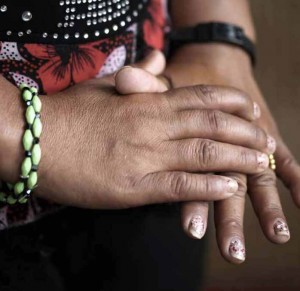 Last week, the Women’s League of Burma marked the International Day for the Elimination of Violence Against Women by calling upon the incoming National League for Democracy Government to take a serious stance on the protection of women from sexual violence. According to their statement, “Women and girls in the Union of Burma are facing with different kinds of violence daily. Especially in ethnic areas, continuous impunity remains for the military personal who continued to commit sexual violence against women and girls.”
Last week, the Women’s League of Burma marked the International Day for the Elimination of Violence Against Women by calling upon the incoming National League for Democracy Government to take a serious stance on the protection of women from sexual violence. According to their statement, “Women and girls in the Union of Burma are facing with different kinds of violence daily. Especially in ethnic areas, continuous impunity remains for the military personal who continued to commit sexual violence against women and girls.”
The International Day, observed each year on 25 November, was initiated by the United Nations General Assembly in 1999 to recognize the widespread physical and sexual violence against women around the world. Considering that globally, one out of three women have experienced physical or sexual violence, it is crucial for the international community to address this pandemic and the gender inequality that fuels it. In Burma, sexual violence is widespread and perpetrators – particularly those within the Burma Army – share complete impunity from prosecution […]
The International Day, observed each year on 25 November, was initiated by the United Nations General Assembly in 1999 to recognize the widespread physical and sexual violence against women around the world. Considering that globally, one out of three women have experienced physical or sexual violence, it is crucial for the international community to address this pandemic and the gender inequality that fuels it. In Burma, sexual violence is widespread and perpetrators – particularly those within the Burma Army – share complete impunity from prosecution.
• • •









 All posts
All posts